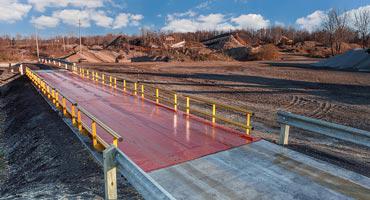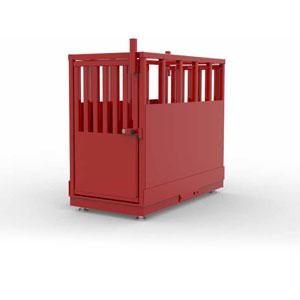The B-TEK Learning Center
Resources to help you scale your business with B-TEK.

When purchasing a truck scale, you have a choice between digital scales and analog scales. Explore the two types of scales and decide the best fit for you.
When purchasing a truck scale, you have a choice between digital scales and analog scales. Explore the two types of scales and decide the best fit for you.
There are many different options to consider when purchasing a truck scale. In addition to making sure your new weight measurement system will give you the accurate measurements you need, you'll also be looking at weight capacity, galvanized or stainless steel vs concrete deck, and dozens of other considerations. One of those big options is choosing between a digital weighing scale and an analog weighing scale and exploring the pros and cons can be a bit more challenging than choosing between two kitchen scales on Amazon.
Nowadays, there are a huge range of weight systems available. The good news is, picking a truck scale is a bit more straightforward than sorting through the long list of optional features you can find on a digital bathroom scale. However, there are some key factors that should be considered when comparing digital and analog truck scales.
Let's take a look at the two types of scales and you can decide which is the best fit for you.
Analog vs Digital Weight Reading Signals
Analog and digital signals are types of signals that both carry information from the weighing machine to the display where you'll check the weight reading. Analog signals have been around forever and are mostly used in communication systems, think AM and FM radio. Digital signals represent more sophisticated data that is processed faster and is less likely to be disrupted. Think of Wi-Fi or Bluetooth connectivity compared to your old “rabbit ears" antenna TV (a form of analog signal).
Let's now take what we know about analog and digital signals and relay that into how analog and digital load cells function.
An analog load cell measures the amount of resistance of compression caused by weight being applied to the strain gauge and converts it to an analog signal, or voltage. Each load cell is connected to a junction box that sums each load cell's voltage and transmits the sum to the scale indicator. The indicator then converts the sum to a digital signal and displays the weight.
While a digital load cell technically starts as an analog signal, this signal never leaves the load cell as an analog signal. The conversion to digital happens directly on the main board of the digital load cell and thus the transmitted is of higher quality and stays that way. There is no conversion needed later on and sometimes a junction box can be avoided.
 OK, so how do you apply this to purchasing a truck scale? Let's look at a few key features of the digital load cell that the analog load cell doesn't offer.
OK, so how do you apply this to purchasing a truck scale? Let's look at a few key features of the digital load cell that the analog load cell doesn't offer.
When Digital Scales are a Better Choice
First, because the digital signal is of higher quality, troubleshooting the digital load cell, and consequently any scale issues, is much easier. This can be done remotely via computer or from the scale house itself. The days of a technician measuring the voltage at each load cell or junction box are a thing of the past with a digital load cell.
Second, and related to the first point above, if there is a problem with any of the load cells or the indicator, these components are easy to replace since all of the components store calibration data. Calibration data can be downloaded from the indicator to the new load cell, or from the load cell to the new indicator. In many situations, this can avoid having your local service company come out to fix and/or re-calibrate your scale. Not only does this save serious time but think about the money that can be saved if your on-site maintenance crew can fix scale problems and negate the line of trucks that would stack up while waiting for your service provider.
Third, digital load cells are guaranteed against lightning. If you put a large slab of steel in the middle of a field, it's going to act as a lightning rod of sorts. The last thing you want is a $5,000+ bill every time a thunderstorm comes through and lightning wipes out your components or power supply. Because of the higher quality digital signal, this technology has proven to be completely resistant to any lightning or surge events, provided the scale is properly grounded.
And last but certainly not least, the digital load cell is more accurate. What is more accurate you may ask? Accuracy can first be represented by the digital sensors being the first truck scale precision sensors to be approved in 10lb. increments. Think of this as being able to get more product in a truck or being able to dial in the weight more precisely when filling on the scale. But maybe, more importantly, more accuracy is represented by years of data that shows when these load cells are in the field they can typically go years at a time without being calibrated or adjusted. So, when would it make sense to purchase analog load cells you may ask?
When Analog Scales are a Better Choice
If minimizing your up-front cost is a key factor in your truck scale purchase, you will likely be able to save around 5-8% by purchasing an analog truck scale.
If you would rather keep your existing weight scale indicator because it has a computer program or custom ticket associated with it, then an analog truck scale might also be for you.
Lastly, although rare, some service companies are not well versed in servicing digital truck scales. It's best to ask your service company if they are comfortable servicing a digital truck scale before purchasing one. If they aren't, it might be best to stick with an analog system.
Find the Perfect High-Precision Weighing Solution
As one of the only companies in the world to manufacture digital load cells, we've done more than just make your scales durable - we've made them smarter too! Industry-leading warranties, predictive error logging, automatic data uploading, and protection against lightning strikes are just a few of the things that we guarantee with our TRUDigital technology. In other words, smart scales that are intuitive, make sure your digital scale gives the high precision, accurate readings you need.
As with all of our articles, we want to make sure you are as informed as possible before making a big decision like purchasing a truck scale. If we can help provide any more clarity on load cell technology, weight measurement, or anything truck scale related, please don't hesitate to contact us.








